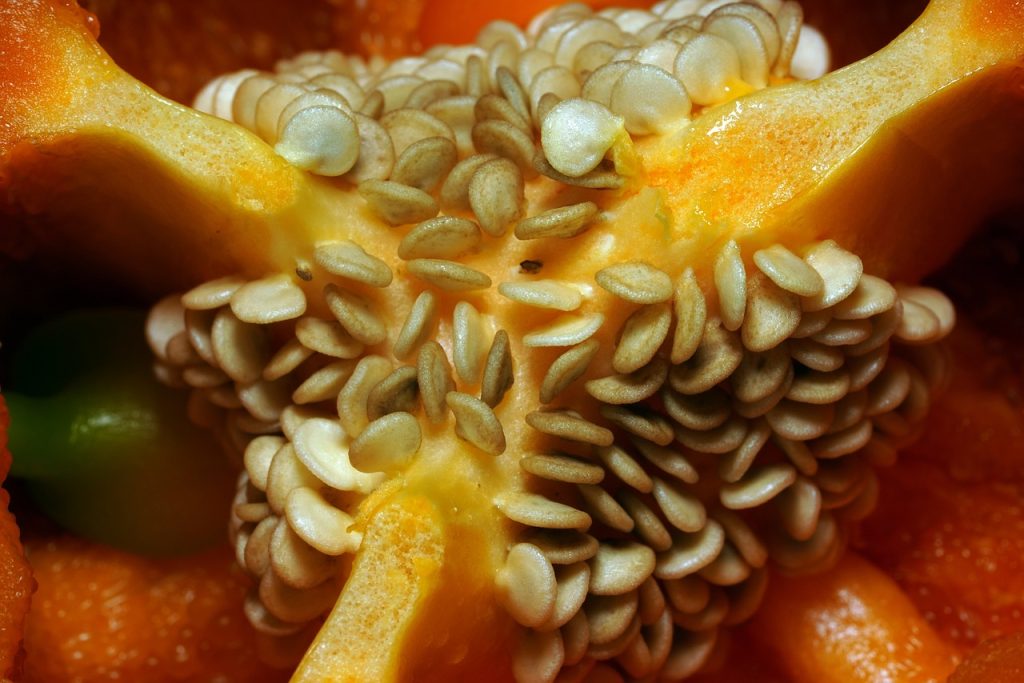Yes, bell pepper seeds are edible. They have a slightly bitter taste and are often used in cooking to add flavor. Some people also like to chew on them as a snack.
- Rinse the bell pepper seeds in a strainer with warm water to remove any debris
- Place the rinsed seeds on a paper towel to dry
- Spread the seeds in a single layer on a baking sheet and roast at 200 degrees Fahrenheit for about 10 minutes, or until they are dry and slightly browned
- Allow the roasted seeds to cool before eating
Enjoy as is, or use them as an ingredient in salads, soups, or other dishes
What Happens If You Eat Red Pepper Seeds?
If you eat red pepper seeds, you may experience a burning sensation in your mouth and throat. This is because the seeds contain capsaicin, which is the compound that makes peppers hot. In high concentrations, capsaicin can be an irritant to the skin and mucous membranes.
In rare cases, it may even cause an allergic reaction. If you have any concerns about eating red pepper seeds, talk to your doctor or a registered dietitian.
Can You Eat the Seeds in Mini Bell Peppers?
Yes, you can eat the seeds in mini bell peppers. They are actually a good source of nutrients, including fiber, vitamin C, and carotenoids. Just be sure to wash them first to remove any dirt or pesticide residue.
Can You Eat the Whole Bell Pepper?
Yes, you can eat the whole bell pepper! The flesh of the bell pepper is safe to eat, and in fact, many people enjoy eating bell peppers raw. The skin of the bell pepper is also edible, but some people find it to be tough and bitter.
If you don’t mind the skin, then go ahead and eat it – otherwise, just stick to the flesh.
Are Bell Pepper Seeds Good for You?
Bell peppers are a nutritional powerhouse. One cup of red bell pepper seeds contains:
- 7 grams of fiber
- 6 grams of protein
- 9% of the RDA for vitamin C
- 8% of the RDA for vitamin B6
- 10% of the RDA for folate
In addition to being an excellent source of vitamins and minerals, bell pepper seeds are also a good source of antioxidants. Antioxidants help to protect our cells from damage caused by free radicals.
Free radicals are unstable molecules that can cause cell damage, leading to inflammation and disease. Bell pepper seeds contain high levels of carotenoids, which are powerful antioxidants that help to neutralize free radicals in our bodies.
Can You Eat Red Bell Pepper Seeds?
If you’ve ever eaten a red bell pepper, you may have noticed some small, black seeds in the center of the fruit. You may have wondered if it’s safe to eat these seeds. The answer is yes!
Red bell pepper seeds are edible and actually quite nutritious. Red bell pepper seeds are a good source of fiber and contain vitamins A, C, and K. They also have a variety of antioxidants that can help boost your immune system. While there’s no need to go out of your way to eat red bell pepper seeds, they’re definitely not harmful if you happen to consume them.

Why Remove Seeds from Bell Peppers?
If you’ve ever eaten a bell pepper, you know that the seeds can be quite pesky. They get stuck in your teeth and can be difficult to chew. So why not just remove the seeds before eating?
It turns out that there are a few good reasons to remove the seeds from bell peppers. First, they can contain harmful toxins that can make you sick. Second, they can add an unpleasant bitterness to the pepper.
Finally, they can make the pepper less nutritious by preventing your body from absorbing all of the nutrients. So next time you’re prepping a bell pepper for a meal, take a few extra minutes to remove the seeds. Your taste buds (and your stomach) will thank you!
Conclusion
If you’re wondering whether you can eat bell pepper seeds, the answer is yes! Bell pepper seeds are not only edible, but they’re also a good source of vitamins and minerals. Bell pepper seeds contain vitamin A, vitamin C, iron, and magnesium.
They’re also a good source of fiber. So if you’re looking for a healthy snack option, consider munching on some bell pepper seeds.
